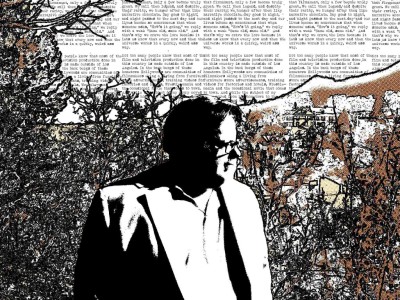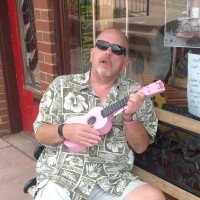What inspired you to write “Mephisto?” Are you new to the noir genre? Because if you are, you’ve definitely found your calling.
I was getting fat, and somewhat cynical about politics as we headed into the 2008 election cycle so I decided to volunteer for the Obama campaign. I live in a small tourist town in the foothills below Pikes Peak and walking the hills and meeting my neighbors was delightful. It was during these canvassing assignments that I met the stoner featured in the story and honestly laughed about that for days.
So, in 2010 I decided to work for Senator Michael Bennett and this time I canvassed a part of my little community that I did not know existed. It’s funny how we settle into classes and cliques and ignore everything else. My town tends to be upper middle class and well educated, but what was down in the flatlands were people living in run-down apartments and converted hotels and they were seedy. It surprised my middle class, Midwest, bourgeois values and deeply affected my views. And there in the midst of this squalor I met this old woman who ranted—quite intelligently—about Ayn Rand and Objectivism for more than an hour. But she lived it. She lived as she believed. Her apartment was pretty much as described in the story: littered in drug paraphernalia, magazines, and longhair political tomes. That was my inspiration. I’m sorry to say she didn’t pluck a chicken during our visit. I added that just to make her creepy.
As for noir…I love the fiction of James Ellroy and Raymond Chandler. I’m even deconstructing Richard Matheson’s short story “Duel” as part of another project and although Matheson is often thought of as a sci-fi and horror writer, I think “Duel” rates up there with the best of noir. By the way, the title “Mephisto” comes not from Faust but from Harlen Ellison’s noir novella, Mephisto in Onyx.
“Mephisto” both surprises and unsettles in its Americana-infused setting, its seemingly good-guy narrator, and its most surreal character, the chicken-plucking, shrewd old woman, Agnes. Does Agnes, to you, represent something more than just some random lady opening her door to a political canvasser? In this 2012 election year, I have to wonder.
When you read Thomas Wolfe or Jack Kerouac, you get this sense that their work is a love story for America. It sounds corny but I love America. The fiction I write is always set in the American landscape and part of this landscape is the clash of ideas. Despite what you hear on Fox News or MSNBC, democracy is pluralistic and conflict is as American as pickup trucks.
The Agnes character…well, she’s an exaggeration of that dark corner of your mind where you wish you could just kill the person who is texting at the movies. Agnes is where our inner barbarian lives. That kind of person appeals to the anarchists and idealists in our midst. She is not real. Or so I thought. Just a few days ago, I read a story about an eighteen-year-old girl who murdered her thirteen-year-old neighbor because she wondered what it would be like. The scary thing is, she liked it.
Hey, did you feel that? Yeah, I just felt a shiver up my spine, too.
You mention in your author bio that you are a script doctor. How does one prepare for such a task? And what do you as script doctor typically hear with your stethoscope?
I started my career in film as a production assistant, and then I moved on to become Line Producer and Assistant Director for such cinematic achievements as Spittin Image, The Spirits of Jupiter, Alien Seed, and Robo-CHIC (Please, no letters from Eric Estrada fans about what it was like to work with him). After a long illness, I turned to screenwriting and did mostly corporate video and pseudo-documentaries often referred to as “info-tainment.”
A producer’s first job is to hire the right people for the project. The second is to bring it in on budget. So when you have a script that stinks and you don’t want to pay the full amount for a re-write, you hire a writer you trust. He or she becomes a script doctor.
I have different strengths for different producers. One thinks I’m good at story structure so I’ve been hired to add or delete scenes that help with structure. That might be as simple as writing a new beginning or a new ending. Another producer may think I’m good at humor. So I sprinkle the script with jokes. An animation producer has just hired me to “punch up” five short animation films he’s doing that will ultimately end up on his YouTube channel to promote his animation company. In many ways when doctoring I’m doing the job of an editor in print, trying to improve the script without losing the flavor and voice of the original piece.
BTW: “Punch up” is code for “the script needs a lot of work.”
Many of us prose writers are foreign to the idea of writing for television; screenwriting courses are available in many places, but I, for one, find the format quite daunting. Any advice to those of us who are afraid to try our hand at it?
I think of myself as a filmmaker first, a writer second and I think the best screenwriters view their job the same way. You have to think like a filmmaker and accept the boundaries of the medium. Personally, I like the limitations of writing for the screen. It’s sort of like writing a sonnet. There are rules and a definite time limit: 30-second TV commercials, 3-minute online videos, 90-minute feature films. However, the collaboration is the most thrilling part. A good director can take a scene and give it a life you never envisioned sitting at your computer screen. It’s magic.
When writing for film or TV, you have to remember that the script is really a blueprint for the production. The Line Producer will go through the script and make notes on everything from wardrobe to props to actors to time of day. You have to tell him that stuff without getting too poetic about it. Also, a page of script equals a minute of screen time so you have to compress details into short descriptive paragraphs.
When I first started writing prose, Bob McGuill, a friend of mine and fantastic short fiction writer, told me I was very good at narrative compression. You can see it in my description of the apartment. That comes from years of screenwriting.
One more note about writing for the screen, whether it is a commercial, employee training film, or movie, there is no entrance or exit. The action begins and ends mid-scene.
You live in Colorado. How do you enjoy your writing life there as opposed to L.A. or other television production locales where you’ve spent time?
In my thirty-plus years as a filmmaker, I’ve run camera as race cars have soared up Pikes Peak, I was the assistant director that called “Action!” on a stunt where the stuntman was seriously injured, I’ve flown over Garden of the Gods in a helicopter, sat next to a stunt driver as he practiced a dangerous mountaintop turn, I’ve filmed in hospital emergency rooms, and met big-name Hollywood stars. I’ve had the pleasure of working with major names in the business. Worldwide, millions of people have watched shows produced from the more than two million words that I have written. I have taught autobody repairmen how to attach a door, and line chefs how to cook, and I’ve done most of it from Colorado.
Hollywood is in your hometown. Most of the television and film production in this country is done outside of Hollywood. And film and television are the second largest U.S. export.
Live where you want to live. Work where you want to work.
What are some current and future writing projects you have that we can perhaps look forward to reading before the Mayan apocalypse hits?
My writing mentor, Bob, has challenged me to write one short story a week. I have not lived up to the challenge but I am writing about one every three weeks. After two years, that’s a lot of stories. Most are crap. Some are good. One is as close to perfection as anything I’ve ever written or read. Frankly, it scares me; I’m not sure what to do with it. I have an unpublished novel set in the same town as “Mephisto,” which I’m sure has been turned down by every agent in the English-speaking world.
But that’s okay. I have never written anything as long as that book and it was an extraordinary learning experience. We are all learning. I feel honored every time someone cares enough to read anything I’ve written. Bonnie, you and the staff at Penduline honor me by putting my humble story in the same issue as so many other fine writers. Now, at the time of this writing, I have no idea who they are but these artists are brethren because they are doing the heavy lifting of writing and publishing.
When I was a nerdy nineteen, I met George Takei (you know, Sulu) at a Star Trek convention and I asked him how could I be a part of the Star Trek universe. He asked me if I realized Star Trek was just a movie based on a TV show. I told him I did.
“Well,” he asked in that deep baritone voice, “have you ever worked in the film industry?”
“No,” I said.
“If you want to be a part of Star Trek you first have to be a in the film industry.”
So I asked him how do I do that?
He sighed, looked at the stack of fan photos he had to sign and then smiled. “You just do it.”
Three months later I had my first paying job as a production assistant on a national commercial for Dodge. Here’s to my fellow writers who are “doing it.”



